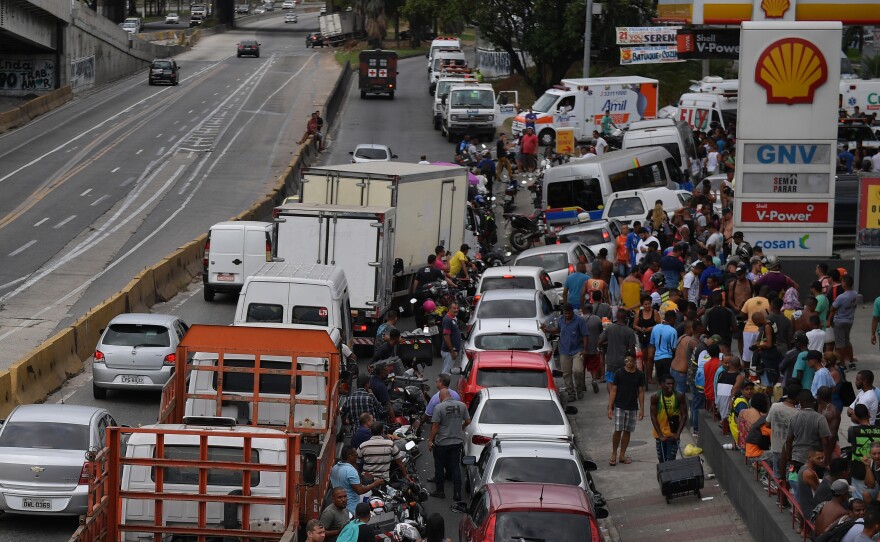For a moment in Brazil, it seemed likely the strike that has interrupted the country's major thoroughfares for days on end might finally be headed for a resolution. President Michel Temer appeared to blink after a standoff with truck drivers' unions, announcing late Sunday that his government would comply with their central demand to reduce diesel prices.
But as the sun rose over Brazil's major highways Tuesday, an observer would be forgiven for thinking no such offer had been tendered. Many areas of the country looked much as they have since the strike began nine days ago, with roadblocks lingering, long lines snaking from gas stations, and store shelves bare from lack of shipments.
Some truck drivers have headed back to work, but for many others — defiant of Temer's government or of their own union leaders, or both at once — the strike still proceeds apace. They remain deeply dissatisfied with the sour brew of soaring international oil prices and depreciating currency at home, regardless of the recent proposal to drop diesel prices the equivalent of about 13 cents per liter and freeze them for 60 days.
Further complicating the negotiations is the fact that it can be tough to get a handle on who exactly "they" are, when referring to the leaders of the strike. The Financial Times reports that many trucks seen on the roads Tuesday bore large banners proclaiming, "The unions don't represent us."
"It's quite hard to figure out exactly who's participating in the action, and the answer is that it's a mixture," NPR's Philip Reeves says. "Some of the truckers own their own vehicles. There have been accusations that the trucking companies are behind [the strike]. And the unions are very active, too."
Temer's government has also blamed agitators for infiltrating the strikers and stirring unrest.
"Starting today, we will begin to find those infiltrators and we will fine those companies," Public Security Minister Raul Jungmann told Reuters on Tuesday. "They know the price they will pay for the suffering they have imposed on the Brazilian people."
What is clear, at least, is the nationwide effect of the strike: shortages of perishable foods, school closures, grounded flights, even the deaths of tens of millions of chickens. Companies in Brazil, the world's largest poultry exporter, have had to carry out massive culls because the lack of transport has deprived them of enough feed to keep the birds alive.
"They say that as many as a billion birds are at risk of being culled," Reeves adds.
The military and police stepped in Tuesday to escort some 300 trucks to their destinations when it comes to essential supplies for hospitals and some airports, as they have at times during this strike, according to The Associated Press. Authorities have also managed to remove a significant number of the hundreds of blockades set up by truckers.
It's unlikely that the situation will improve much over the next several days for Temer, who has been beset by corruption scandals and has been intensely unpopular for much of his time in office. Oil worker unions have announced a three-day strike of their own, expected to begin Wednesday.
Still, as the Globe and Mail's Stephanie Nolen notes, at least some in Brazil are keeping their sense of humor about it, declaring the fringe benefits of the strike's complications — such as fewer robberies and a little more space for cyclists on the road.
Copyright 2018 NPR. To see more, visit http://www.npr.org/.






